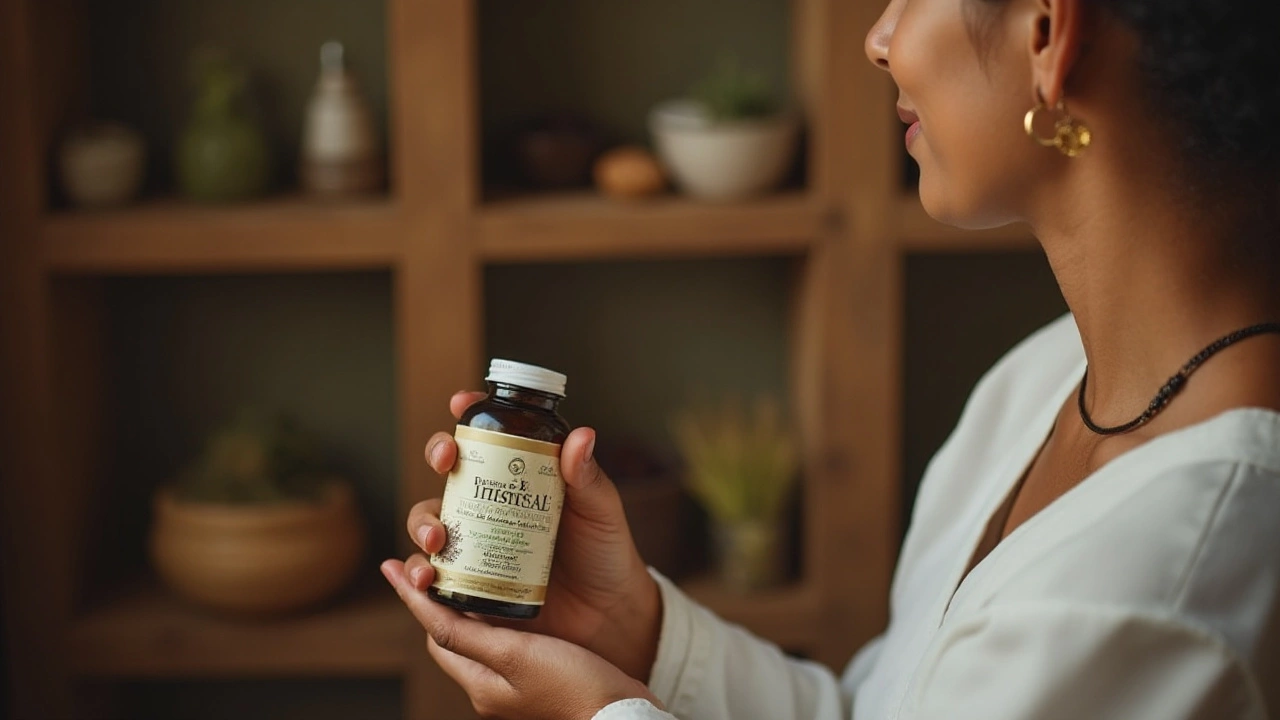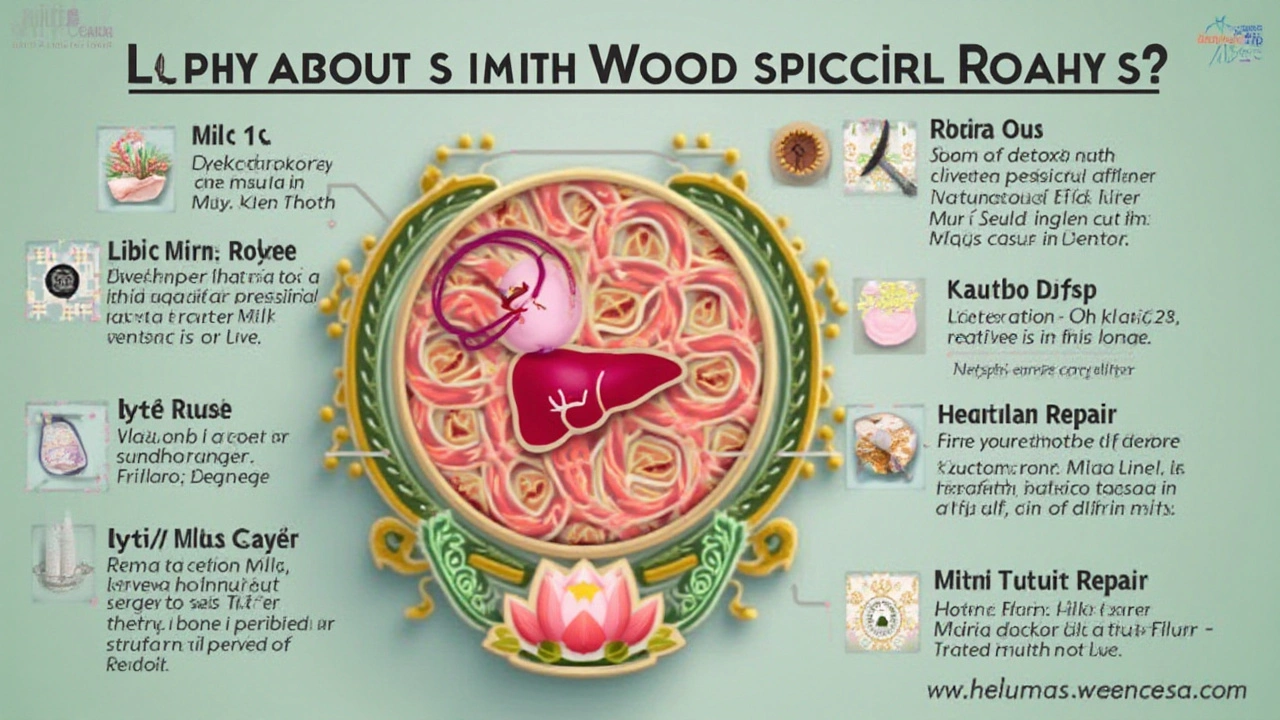
The liver is a powerhouse organ, tirelessly working to detoxify our bodies, process nutrients, and regulate metabolism. But like any other part of the body, it is not invincible. Modern lifestyles, full of processed foods, alcohol, and other chemicals, can take a toll on liver health over time. Fortunately, nature offers some remarkable solutions for supporting this vital organ.
One such solution is the use of herbal supplements, particularly milk thistle. Known for its liver-loving properties, this herb has been cherished for centuries. But what makes it a standout in the natural world, and how can it truly benefit your liver? In this article, we'll explore the critical role of the liver, how damage can occur, and the ways milk thistle and other herbs can assist in maintaining your liver's wellbeing.
- The Importance of Liver Health
- Understanding Liver Damage
- Herbal Solutions for Liver Repair
- Milk Thistle: The Star Herb
- Scientific Backing and Studies
- Tips for Using Milk Thistle Effectively
The Importance of Liver Health
The liver is among the largest and most significant organs within the human body, playing a pivotal role in maintaining our health and well-being. It is essential to understand that the liver acts as the body’s central processing unit. It filters the blood coming from the digestive tract before passing it to the rest of the body. This organ carries a hefty responsibility for detoxification, which involves transforming potentially harmful substances into safe byproducts, all while efficiently managing carbohydrates, fats, and proteins from food.Liver Health must be prioritized because any malfunction or decline in its efficiency can lead to a cascade of health issues. People often underestimate the liver's indispensability until complications arise. From jaundice and fatigue to serious conditions like cirrhosis or liver failure, the impacts of a troubled liver are far-reaching and profound. That is why prioritizing its health is critical.
An intriguing aspect of the liver is its ability to regenerate. When the liver is damaged, it can repair itself by replacing damaged cells with new ones. This fantastic quality, however, must not be a reason to neglect it. Continuous exposure to toxins such as alcohol and drugs diminishes this ability, making regular maintenance and a healthy lifestyle non-negotiable.
Another function of vital significance is the production of bile, which aids in digestion by breaking down fats. It also stores vitamins and minerals, ensuring that they are available when the body needs them. Due to the intricacies of modern-day living, from processed diets to environmental pollutants, keeping one's liver in top shape is more challenging yet imperative.
By being aware of these facts and taking sensible steps such as consuming a diet rich in fresh fruits, vegetables, and taking supplements like milk thistle, one can protect liver health significantly. Such practices not only shield the liver but support its vast array of responsibilities, including glucose regulation and hormone production.
Taking time to understand and nurture this remarkable organ saves potential future discomfort. It is both wise and possible to care for liver health proactively, promoting an enduringly vibrant life.
Understanding Liver Damage
The liver is a resilient organ, but it is not impenetrable. It can regenerate, a unique feature that many organs do not possess, allowing it to recover from certain levels of damage. However, consistent exposure to harmful substances can overwhelm its capabilities. Alcohol is perhaps the most notorious culprit, consistently linked to liver disease, but it's not the only one. The abundance of refined sugars and unhealthy fats present in modern diets also contributes significantly to this issue. Moreover, prolonged use of some medications can accumulate toxicity levels in the liver, taxing it beyond its limits.
When the liver is consistently bombarded with toxins, it undergoes changes at the cellular level that compromise its function. This process often begins with fatty liver disease, a condition that emerges when excess fat builds up in the liver cells. If left unchecked, it can evolve into more severe forms of damage such as inflammation (hepatitis) and fibrosis, where scar tissue starts replacing healthy liver tissue. Over time, these conditions can lead to cirrhosis, an irreversible state where scarred tissue dominates, severely impairing liver function.
"The liver is a warhorse for the body, tirelessly filtering toxins and regulating bodily processes. Yet, if we don’t prioritize its care, it becomes the most silent sufferer," remarks Dr. Stephen Harrison, a notable figure in hepatology.
Another critical factor is viral infections like Hepatitis B and C. These viruses can cause chronic inflammation, slowly damaging liver tissues over the years. Without intervention, they pave the way for cirrhosis and even liver cancer. With such a variety of potential threats, the importance of maintaining liver health cannot be overstated. Regular health check-ups, a balanced diet rich in nutrients, and being mindful of substance intake, including over-the-counter medications, are essential preventive measures. The need for liver detoxification methods becomes apparent, leading many to explore herbal remedies such as milk thistle for effective liver support.
In understanding liver damage, one must also consider environmental toxins. Many industrial chemicals and pollutants can contribute to liver damage. These substances can enter the body through food, air, and water, adding another dimension to the liver's burden. Enhanced awareness and efforts to limit exposure are crucial in reducing risk. As understanding of liver damage deepens, it underscores the liver's vital role and how easily it can be overlooked until significant harm has occurred.

Herbal Solutions for Liver Repair
The quest for healing herbs is as ancient as civilization itself, and when it comes to the liver, certain plants have earned a revered status due to their impressive abilities. From detoxification to regeneration, these natural remedies are not just folklore but have been backed by scientific studies. Foremost among these is milk thistle, a plant native to the Mediterranean and cherished for its liver-friendly properties.
The active ingredient that makes milk thistle so effective is silymarin, a compound with potent antioxidant and anti-inflammatory effects. Silymarin is known to protect liver cells from toxins, aid in the repair of damaged cells, and enhance protein synthesis. This can be particularly beneficial for those seeking liver detox or dealing with conditions like fatty liver, cirrhosis, or even hepatitis. As you bring milk thistle into your routine, understanding how it functions will empower you to make informed choices for your liver health.
Another herb worth considering is dandelion root. Often cast aside as a pesky weed, dandelion has been used in herbal medicine for centuries. Its diuretic properties encourage the flushing out of toxins, easing the load on the liver. In recent studies, dandelion extract has shown potential in reducing the accumulation of fats in the liver, a critical factor in maintaining overall liver function. Complementing these two is turmeric. Known for its vibrant yellow color and culinary uses, turmeric contains curcumin, a compound that offers anti-inflammatory and antioxidant benefits. Curcumin can help reduce markers of liver inflammation and support liver cells' repair mechanisms.
"Research continues to unveil the impressive abilities of herbs like milk thistle and turmeric in promoting liver wellness," states Dr. Emily Stone, a leading expert in herbal medicine. "Their natural compounds work synergistically with the body's processes, providing a holistic approach to health."
In your journey toward liver vitality, it's also important not to overlook artichoke leaf extract. Artichokes, a close relative of milk thistle, contain a compound called cynarin. This natural ingredient stimulates bile production, enhancing the liver's ability to digest fats and expel toxins. Frequently consumed as a tea or supplement, artichoke extract can be a valuable ally in liver health. Additionally, studies have suggested that regular consumption of artichoke supplements can lead to improved biomarkers of liver function, especially in individuals with non-alcoholic fatty liver disease (NAFLD).
Importantly, while these miraculous herbs can promote liver repair, integrating them requires attention to dosage and quality. Always choose supplements from trusted sources and, if possible, consult with a healthcare professional familiar with herbal remedies. The synergy between such herbs can create a protective barrier in our daily lives, something especially vital when considering modern dietary habits and environmental stressors. When used wisely, herbs can be a formidable tool in nurturing the liver's natural resilience and repair capabilities. So why not embark on this herbal journey and give your liver the protection it deserves?
Milk Thistle: The Star Herb
Milk thistle, scientifically referred to as Silybum marianum, isn't a newcomer in the domain of herbal remedies. This striking plant, adorned with vivid purple flowers and milky white veins, has been a guardian of the liver for centuries, thanks to its active compound known as silymarin. Silymarin is a mixture of flavonolignans, which are primarily responsible for the therapeutic properties milk thistle boasts. By acting as an antioxidant, silymarin helps combat the oxidative stress that often leads to liver damage, ensuring that the liver can continue its vital duties in detoxification and metabolism regulation.
The benefits of milk thistle don't just stop at its antioxidant capabilities. Researchers have discovered that silymarin may aid in cell repair and reduce inflammation, fundamental processes for a resilient liver health. By inhibiting toxins from binding to liver cells, milk thistle effectively shields one of our body’s most essential organs from harm. This mechanism of action makes it a popular choice among individuals looking to perform a thorough liver detox.
In case you needed a more convincing testament to its prowess, a study published in the journal 'Phytotherapy Research' reveals that individuals with liver damage, notably from alcohol consumption, showed measurable improvement after regular milk thistle supplementation. Notably, the study highlights improved liver function tests among participants, underscoring milk thistle’s potential role in clinical settings. According to the European Medicines Agency, milk thistle has been traditionally used for over 2,000 years for liver issues, suggesting its reliability and longstanding notoriety in herbal medicine.
"Milk thistle is perhaps the most well-researched plant for liver support and liver health applications," states Dr. Mark Blumenthal, Executive Director of the American Botanical Council. This statement reflects both historical reverence and contemporary scientific acknowledgment.
Including milk thistle in one's daily regimen doesn’t require a dramatic lifestyle change. The herb is readily available in several forms, from capsules to teas, making it convenient to incorporate into various lifestyles. However, consultation with a healthcare provider is recommended before ramping up usage, especially for those already undergoing treatment for liver-related conditions. Awareness and moderation are crucial, guaranteeing that this herbal powerhouse is both safe and effective for you.
Some studies even suggest that in addition to bolstering liver health, milk thistle might also support cardiovascular health by improving cholesterol levels. But, its primary fame and utility remain orbiting around its liver-centric benefits, which have garnered respect and reliance both in traditional practices and modern alternative medicine.
Ultimately, milk thistle’s storied history and respected profile in both traditional and scientific communities make it a promising option for those seeking natural solutions for liver wellness. As ongoing research continues to unfold, the full extent of milk thistle's potentials awaits further illumination, potentially enriching both daily practices and medical recommendations.

Scientific Backing and Studies
Milk thistle stands out as a powerful ally in the realm of herbal remedies, particularly for liver health. The active ingredient, silymarin, a complex of flavonoids and antioxidants, is primarily responsible for its liver-protective functions. Over the years, various studies have shed light on this natural substance, revealing its potential to support strong liver health and even aid in the repair of liver damage. One prominent study published in 'Phytotherapy Research' conducted a meta-analysis, reviewing multiple clinical trials that tested milk thistle's efficacy. The conclusive results indicated that silymarin effectively improves liver function, as evidenced by enhanced liver enzymes in participants who consumed it regularly. This finding is noteworthy because it suggests that milk thistle can contribute positively to our overall liver detoxification processes.
The efficacy of milk thistle doesn’t just end there. Further research delves into its protective capabilities against oxidative stress within the liver. Oxidative stress, a precursor to more severe liver conditions, arises when there is an imbalance of free radicals and antioxidants. Silymarin helps to stabilize this balance, thereby minimizing damage. It's also been attributed to an increase in protein synthesis, promoting the regeneration of liver cells, which is crucial for repairing damaged liver tissues. A study published by the 'National Institute of Health' found that patients suffering from liver cirrhosis showed significant improvement in liver function upon milk thistle supplementation, opening pathways for its therapeutic application.
Dr. Arthur Rosen states in his review in 'The Journal of Hepatology', "Milk thistle’s role in reducing liver inflammation potentially marks it as an essential dietary supplement for individuals at risk of liver diseases."There’s burgeoning curiosity around the efficacy of milk thistle in alcohol-related liver conditions as well. Research showcases that individuals with alcohol-induced liver diseases may experience relief and even reversal of liver stress symptoms thanks to consistent silymarin intake. Such findings are not just confined to theoretical studies but are supported by practical clinical evidence. A surprising aspect of milk thistle is its ability to interface positively with conventional medical treatments, a trait rare among herbal remedies, with some studies even highlighting its potential to enhance the efficacy of traditional liver medications.
However, it is vital to understand that while milk thistle showcases promising results, its benefits can be maximized when coupled with healthy lifestyle practices. Emerging studies are increasingly focusing on how milk thistle can be synergistically used alongside other herbs, offering a complementary approach to liver health. As research advances, the prospects for milk thistle as a canonical option within liver treatment protocols continue to grow. The combination of its historical use and modern scientific validation solidifies its standing as a leading herb in liver health management.
Tips for Using Milk Thistle Effectively
Integrating milk thistle into your routine can be a simple yet impactful step towards supporting your liver health. While it’s renowned for its potential to aid in liver repair and detoxification, knowing how to use it correctly is crucial to harnessing its benefits. Acknowledging its long history of use, it’s pivotal to respect the nature of herbal remedies, understanding the characteristics of this herb, which contains silymarin, a potent compound believed to protect liver cells by blocking harmful toxins from binding to them.
First, consider the form in which you consume milk thistle. It's available in several forms: capsules, tinctures, teas, or even as a whole seed. Capsules are convenient and often provide standardized doses of silymarin, typically around 70 to 80%. However, herbal teas might offer a more traditional, soothing approach, mimicking how ancient cultures might have first harnessed its power. No matter the chosen form, ensure it is from a reputable source to guarantee purity and potency.
Another essential aspect is dosage. While the right amount can vary depending on individual health needs and existing conditions, a common recommendation is to start with a lower dose, such as 150 milligrams per day, and gradually increase it. Observing your body's response is crucial. Some users report mild digestive symptoms initially, which generally resolve as the body adjusts. It's advisable to consult with a healthcare professional before embarking on this regimen, especially if taking medications metabolized through the liver.
Timing is another consideration. Milk thistle can be taken with or without food, though many find it easier on the stomach when consumed with a meal. Consistency is key. Regular use may result in the best benefits, and many people include it as a daily supplement for maintenance. While some notice improvements relatively quickly, others may only observe significant changes after several weeks of consistent use. A significant part of herbal health approaches is patience and allowing time for cumulative effects.
Finally, consider combining milk thistle with lifestyle changes. A balanced diet, avoiding excessive alcohol consumption, and regular physical activity complement the supportive role milk thistle can play in protecting the liver. Including other herbal remedies known for liver health, such as dandelion root or turmeric, could further enhance the protective effects. Remember: the journey to optimal health involves a holistic approach. Embrace it as part of an overarching strategy to nurture your body.
According to a study published in 'Phytotherapy Research', silymarin was found to reduce liver enzyme levels, indicating a protective effect on liver cells in patients with liver diseases. Such scientific backing continues to support traditional uses and opens avenues for future research focused on natural liver repair therapies.





Rohan Talvani
I am a manufacturing expert with over 15 years of experience in streamlining production processes and enhancing operational efficiency. My work often takes me into the technical nitty-gritty of production, but I have a keen interest in writing about medicine in India—an intersection of tradition and modern practices that captivates me. I strive to incorporate innovative approaches in everything I do, whether in my professional role or as an author. My passion for writing about health topics stems from a strong belief in knowledge sharing and its potential to bring about positive changes.
view all postsWrite a comment